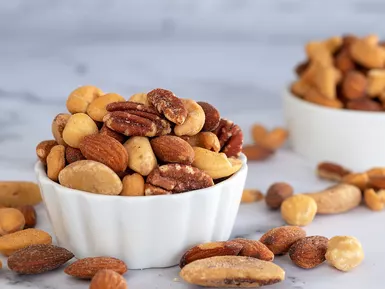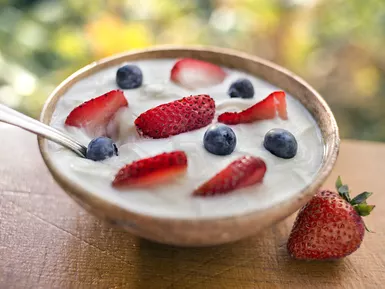
Vitamin E and Weight Loss: Unveiling the Truth
Introduction
In the quest for effective weight loss, many people turn to various supplements, including vitamin E. But does vitamin E really help with weight loss? In this comprehensive blog post, we will explore the relationship between vitamin E and weight loss from a scientific perspective, providing you with evidence - based information and practical strategies for achieving your weight loss goals in a healthy and sustainable way.
The Physiology of Weight Loss
Energy Balance
At its core, weight loss is about creating a calorie deficit. This means that you need to burn more calories than you consume. The human body has a complex system for regulating energy balance, which involves several hormones and metabolic processes. For example, insulin is a hormone that plays a crucial role in regulating blood sugar levels and storing excess energy as fat. When you consume a diet high in refined carbohydrates and sugars, your insulin levels spike, which can lead to increased fat storage. On the other hand, when you consume a diet rich in protein, fiber, and healthy fats, your insulin levels remain more stable, which can help to reduce fat storage and promote weight loss.
Hormone Regulation
Hormones also play a significant role in weight loss. For example, thyroid hormones regulate metabolism, and cortisol is a stress hormone that can increase appetite and promote fat storage. Imbalances in these hormones can make it more difficult to lose weight. Additionally, leptin is a hormone that signals satiety to the brain. When you are overweight or obese, your body may become resistant to leptin, which can lead to increased appetite and difficulty losing weight.
Metabolic Adaptation
Another important factor in weight loss is metabolic adaptation. When you lose weight, your body naturally tries to conserve energy by slowing down your metabolism. This can make it more difficult to continue losing weight, especially if you are not making other lifestyle changes. To overcome metabolic adaptation, it is important to engage in regular physical activity, eat a balanced diet, and get enough sleep.
The Role of Vitamin E in Weight Loss
Antioxidant Properties
Vitamin E is a powerful antioxidant that can help to protect cells from damage caused by free radicals. Free radicals are unstable molecules that can cause oxidative stress, which has been linked to a variety of health problems, including obesity. By reducing oxidative stress, vitamin E may help to improve insulin sensitivity and reduce inflammation, which can promote weight loss.
Fat Metabolism
Some studies have suggested that vitamin E may play a role in fat metabolism. For example, one study found that vitamin E supplementation increased the activity of an enzyme called lipoprotein lipase, which is responsible for breaking down fat in the bloodstream. Another study found that vitamin E supplementation reduced the production of a hormone called adiponectin, which is involved in regulating fat metabolism. However, more research is needed to confirm these findings and to understand the exact mechanism by which vitamin E affects fat metabolism.
Unique Insights into Weight Loss
Tailoring Strategies to Metabolic Types
Not everyone has the same metabolic rate or responds to weight loss strategies in the same way. Some people may have a slow metabolism and need to focus on increasing their physical activity and reducing their calorie intake more aggressively. Others may have a faster metabolism and may be able to lose weight more easily by making small changes to their diet and lifestyle. By understanding your metabolic type, you can tailor your weight loss strategy to your specific needs and increase your chances of success.
Breaking Through Weight Loss Plateaus
Many people experience weight loss plateaus at some point in their weight loss journey. This is when your weight loss stalls, even though you are still following your diet and exercise plan. There are several reasons why weight loss plateaus occur, including metabolic adaptation, muscle loss, and changes in your diet and exercise routine. To break through a weight loss plateau, it is important to make small changes to your diet and exercise plan, such as increasing your physical activity, reducing your calorie intake, or changing the type of exercise you are doing.
Non - Scale Victories
In addition to losing weight, it is important to focus on non - scale victories, such as increased energy levels, improved sleep quality, and reduced stress. These non - scale victories can be just as important as weight loss in terms of improving your overall health and well - being. By celebrating these non - scale victories, you can stay motivated and continue to make progress towards your weight loss goals.
Science - Backed Strategies for Weight Loss
Diet
A balanced diet is essential for weight loss. This means eating a variety of foods from all the major food groups, including fruits, vegetables, whole grains, lean proteins, and healthy fats. It is also important to limit your intake of processed foods, sugary drinks, and saturated and trans fats. One way to ensure that you are eating a balanced diet is to use a food tracking app or website to monitor your calorie intake and nutrient intake.
Exercise
Regular physical activity is also important for weight loss. Aim for at least 150 minutes of moderate - intensity aerobic exercise, such as brisk walking, cycling, or swimming, per week. You should also include strength training exercises, such as weightlifting or bodyweight exercises, at least twice per week. Strength training can help to build muscle mass, which can increase your metabolism and help you burn more calories even at rest.
Sleep
Getting enough sleep is also important for weight loss. When you are sleep - deprived, your body produces more of the hormone cortisol, which can increase appetite and promote fat storage. Aim for 7 - 8 hours of sleep per night to support your weight loss efforts.
Success Stories
Let's take a look at some success stories of people who have lost weight in a healthy and sustainable way. [Anonymized case 1] was able to lose 30 pounds in 6 months by making small changes to his diet and exercise routine. He started by reducing his calorie intake by 500 calories per day and increasing his physical activity to 30 minutes per day. He also made sure to get enough sleep and manage his stress levels. [Anonymized case 2] was able to lose 20 pounds in 3 months by following a plant - based diet and doing yoga and strength training exercises. She also made sure to drink plenty of water and get enough sleep.
One - Day Weight Loss Meal Plan Example
Here is a one - day weight loss meal plan example that provides approximately 1,500 calories and is rich in protein, fiber, and healthy fats:
Breakfast
- Oatmeal with berries and nuts (300 calories)
- Hard - boiled egg (70 calories)
- Black coffee or tea (0 calories)
Snack
- Apple slices with almond butter (200 calories)
Lunch
- Grilled chicken salad with mixed greens, tomatoes, cucumbers, and feta cheese (400 calories)
- Whole grain roll (100 calories)
- Water (0 calories)
Snack
- Carrot sticks with hummus (150 calories)
Dinner
- Baked salmon with roasted vegetables (350 calories)
- Quinoa (100 calories)
- Green tea (0 calories)
Beginner's Guide to Fat - Burning Exercises
If you are new to exercise, it is important to start slowly and gradually increase the intensity and duration of your workouts. Here is a beginner's guide to fat - burning exercises that you can try:
- Brisk walking: Start by walking at a moderate pace for 10 - 15 minutes per day. Gradually increase the duration and intensity of your walks as you get fitter.
- Jumping jacks: Do 10 - 15 jumping jacks per set, 3 - 4 sets per day. Jumping jacks are a great way to get your heart rate up and burn calories.
- Squats: Do 10 - 15 squats per set, 3 - 4 sets per day. Squats are a great exercise for strengthening your lower body and burning calories.
- Push - ups: Do 10 - 15 push - ups per set, 3 - 4 sets per day. Push - ups are a great exercise for strengthening your upper body and burning calories.
- Plank: Hold a plank position for 30 - 60 seconds per set, 3 - 4 sets per day. Planks are a great exercise for strengthening your core and burning calories.
Trustworthiness and Healthy Weight Loss
It is important to note that healthy weight loss is a gradual process that requires patience and consistency. Aim to lose 1 - 2 pounds per week, as this is a safe and sustainable rate of weight loss. Avoid extreme or crash diets, as these can be harmful to your health and can lead to weight regain in the long term. Additionally, it is important to consult with a healthcare professional before starting any new weight loss program, especially if you have any underlying health conditions.
Common Challenges in Weight Loss and How to Overcome Them
Hunger
One of the most common challenges in weight loss is hunger. To overcome hunger, it is important to eat a balanced diet that is rich in protein, fiber, and healthy fats. These nutrients can help to keep you feeling full and satisfied for longer periods of time. Additionally, it is important to drink plenty of water throughout the day, as this can help to reduce hunger and prevent overeating.
Cravings
Another common challenge in weight loss is cravings. To overcome cravings, it is important to identify the triggers that cause your cravings and find healthy ways to cope with them. For example, if you are craving something sweet, try eating a piece of fruit or a small amount of dark chocolate. If you are craving something salty, try eating a handful of nuts or a piece of whole grain bread with avocado.
Lack of Motivation
Lack of motivation is also a common challenge in weight loss. To stay motivated, it is important to set realistic goals, track your progress, and celebrate your successes. Additionally, it is important to find an exercise routine that you enjoy and that fits your lifestyle. This can help to make exercise more fun and less of a chore.
FAQ
How can I lose weight fast and healthily?
Losing weight fast and healthily requires a combination of a balanced diet, regular physical activity, and a healthy lifestyle. Aim to lose 1 - 2 pounds per week by reducing your calorie intake, increasing your physical activity, and getting enough sleep. Avoid extreme or crash diets, as these can be harmful to your health and can lead to weight regain in the long term.
What should I do if I'm hungry during weight loss?
If you are hungry during weight loss, it is important to eat a balanced diet that is rich in protein, fiber, and healthy fats. These nutrients can help to keep you feeling full and satisfied for longer periods of time. Additionally, it is important to drink plenty of water throughout the day, as this can help to reduce hunger and prevent overeating.
How can I break through a weight loss plateau?
To break through a weight loss plateau, it is important to make small changes to your diet and exercise plan. This may include increasing your physical activity, reducing your calorie intake, or changing the type of exercise you are doing. Additionally, it is important to get enough sleep, manage your stress levels, and stay hydrated.
Conclusion
In conclusion, while vitamin E may have some potential benefits for weight loss, more research is needed to confirm these findings. However, by following a balanced diet, engaging in regular physical activity, getting enough sleep, and managing your stress levels, you can achieve your weight loss goals in a healthy and sustainable way. Remember, weight loss is a journey, not a destination, and it is important to be patient and consistent with your efforts. So, start today by making small changes to your diet and lifestyle, and you will be on your way to a healthier, happier you.
Call to Action
This week, start by making a small change to your diet, such as swapping out your regular breakfast cereal for a bowl of oatmeal with berries and nuts. This simple change can help you to reduce your calorie intake and increase your intake of fiber and protein, which can help you to feel full and satisfied throughout the morning.

5 Transformative Weight-Loss Resolutions for Success

Workout Routines & Beyond: Science-Based Weight Loss

Vitamin E and Weight Loss: Unveiling the Truth

Effective Strategies to Lose Midriff Fat for Women

8 Non-Scale Victories in Your Weight-Loss Journey

Unveiling the Ornish Diet: A Path to Sustainable Weight Loss

The Power of Social Support in Weight Loss

Personalized Weight Loss: 4 Strategies for Success

Long - Term Weight Loss: Maintaining Healthy Habits

